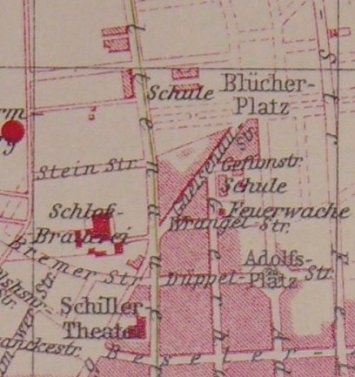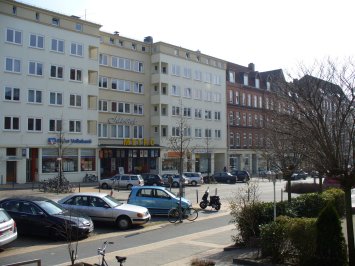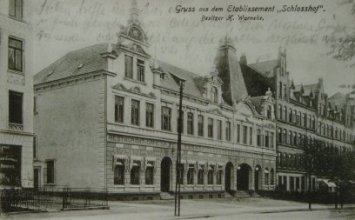Homepage Renate and Klaus Kuhl - Sailors' revolt in Kiel
Virtual Sightseeing Tour "Kiel Mutiny" Nov. 1918
[01] [02] [03] [04] [05] [06] [07] [08] [09] [10] [11] [12]
No. 10: Large meeting of sailors in the "Schlosshof" on 6 November 1918
The " Schlosshof" in the Holtenauer street 162-170 was then often
used for the holding of meetings.
At 6 Nov. Kiel seemed to be still isolated and Noske used all
his oratorical talent to persuade the sailors to accept his proposals
and to terminate the uprising (see below extracts from Noske,
‘Von Kiel bis Kapp’. After an intense debate, no one voted
for Noske's proposals. Even the socialdemocratic newspaper 'Schleswig-Holsteinische
Volkszeitung' contradicted Noske by writing: 'Es kann natürlich
keine Rede davon sein, die Bewegung in dem Sinne abzubauen, dass
etwas von dem aufgegeben wird, was durch sie im gegenwärtigen
Augenblick politisch erreichbar ist. (Naturally it is out of question
to stop our movement in the sense to give up anything that can
be possibly achieved.'
| Present day map | Former map |
|
Größere Kartenansicht |
 |
| The "Schloßhof" received only little danage during WW II. Nowadays it harbours the Metro-Kino (cinema). | Town map, 1910 |
| Present day view | Former view |
 |
 |
| The Metro-Kino in the "Schlosshof" in 2011, photo KK | Post card of the "Schlosshof", picture taken from the junction Steinstrasse, 1908 |
Further information:
Gustav Noske wrote in "Von Kiel bis Kapp" (pp. 23 and 24):
"As at noon representatives of the various units found themselves at the hall of the station to discuss the situation with me, ... ... it had to be triedas soon as possible to get back to an orderly the state. I explained the situation as it appeared to me to the people and outlined ... the horrible condition in which our people are and then led... ... over under which preconditions the Kiel mutiny, which I personally condemned sharply, could be to an end. That political reforms, for which they had risen, would be fulfilled, would be a matter of course. About an amnesty, the government would be listening to reason.
My presentations obviously made a deep impression on the people. Artelt who wanted to go in between, received a dampening from me. The Reichstag members Hoff and Dr. Struve, ... have repeatedly assured me later on that they had never heard a more impressive presentation. I did not allow a discussion, but advised people to talk through what they heard with their comrades and then draw the conclusion in a large representatives meeting to be held in the evening. At the meeting in the ‘Schlosshof’ in the late afternoon ... ... there were about a thousand men present. ... Speakers were interrupted in the middle of their speeches ..., and someone else was talking. ... After a few hours, a considerable part of the sailors got fed up and walked away. Finally, the meeting was closed without any result."
Lothar Popp provides a very different report (interviews 1978):
Noske [and I] were both equal chairmen of the Supreme Soldiers’ Council. Then there was a huge gathering of sailors, what do I know how many thousands, but all met totally unorganised. Then he [Noske] has said literally:
I've never made a secret of the fact that I stand with the Government. You have achieved a victory, a great victory. Kiel is in your hands. You have won. But Kiel is an isolated place and what can you do, ... this and that ... he painted everything black in black. And then, the government offers: No punishment on returning to ships and barracks, reforms and some further gimmicks of that kind.
Then I said, we did not put up this fuss – making a joke - we want the whole system to disappear. What the government is offering us today, will be still valid in a fortnight, if we accept it, as it is today. But in a fortnight the government will no longer be there. ...
And then we voted, there was not a single voice for Noske.
But now I want to say something else: You're here, you speak, what is to come out of it? We must have an organisation. We have to do it as the unions. You go home all of you. We will close the assembly, and in your unit, ship or barracks you choose representatives. That I had already figured out, I proposed to them: torpedo boat so many, battleship so many, five and so on. ... Then we have a body. Just as the unions. In this current form it serves no purpose. No one knows what the others have behind them. That was decided at the meeting. They went home. After a few hours they came back and then they elected the Great Soldiers’ Council, and the Great Soldiers’ Council elected then the Supreme Soldiers’ Council.
And the biggest joke was that Noske said in his speech, the Bavarians do not even think to chase their king away. But indeed have chased him away almost at the same moment.
Annotation: Gustav Noske concedes one page further on: " Regular elections had been conducted during the day in a large number of military units."
The virtual sightseeing tour at a glance:
- Holtenau viaduct and locks >>
- Large drillground (Großer Exerzierplatz) >>
- Karlstraße / Langer Segen >>
- Torpedo workshop Friedrichsort, Germania shipyard Kiel-Gaarden >>
- Barracks (Kasernen) in Kiel-Wik >>
- Marinestation Ostsee >>
- Arrestanstalt (military prison >>
- Trade union house (Gewerkschaftshaus) >>
- Town hall (Rathaus) >>
- "Schloßhof" >>
- Station (Bahnhof) >>
- Graves of the killed revolutionaries and soldiers >>
Real, guided tours on this subject are offered by:
- Geo-Step-by-Step >>
- Ernst Mühlenbrink, via Society for Kiel's Town History
(Gesellschaft für Kieler Stadtgeschichte) >>
- AKENS, Asche Arbeitskreis >>
Last modified: 25 Luly 2017
| Sailors' Revolt / Kiel Mutiny November 1918 - here you'll find the following further information:
|
